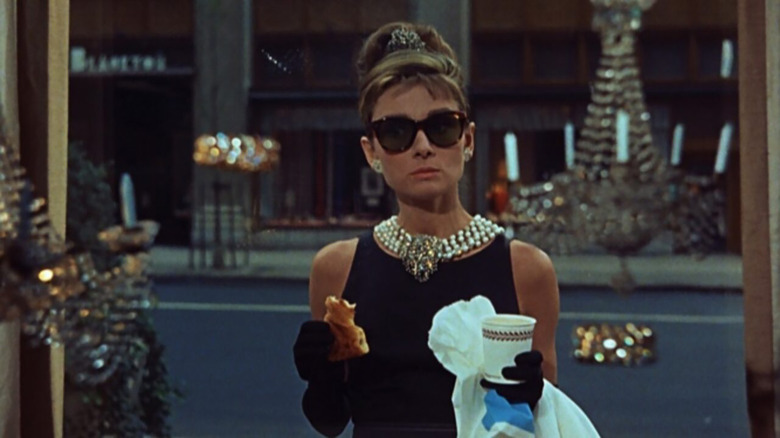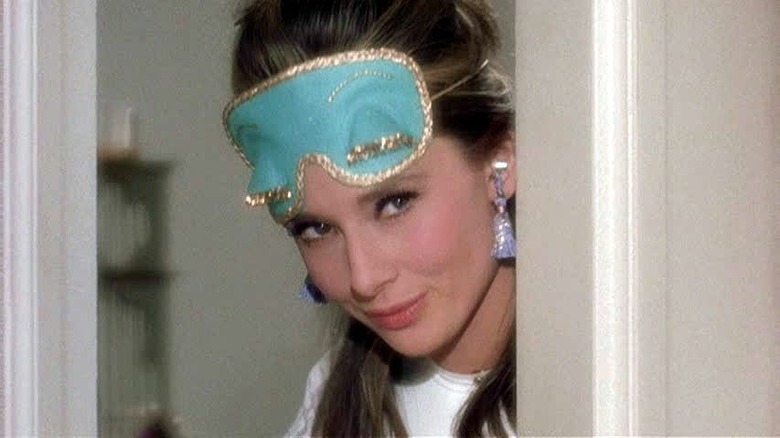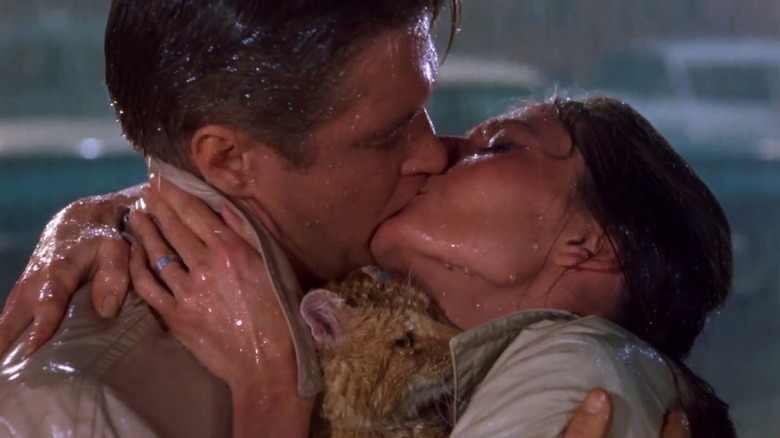How Breakfast At Tiffany's Could Have Been Much More Controversial
I said, "What about 'Breakfast at Tiffany's?'" and she said, "I think I remember the film and as I recall I think we both kind of liked it," and I said, "Well, that's weird because that movie is controversial as hell."
Few films have become omnipresent in the pop culture consciousness quite like "Breakfast at Tiffany's." Even those who have never seen a single frame of the film centered on Holly Golightly can correctly identify the sleek black dress, oversized sunglasses, pearl necklace, tiara pinned beehive hairdo, and comically large cigarette holder as belonging to Audrey Hepburn in the 1961 film loosely based on Truman Capote's novella. I should emphasize "loosely," as the Holly Golightly of Capote's novel is far more provocative and enjoys a life that would have likely terrified audiences raised by The Hays Code.
As iconic as Hepburn's Golightly has become in the canon of American cinema, people are quick to forget how controversial the film's legacy has become. Most notably (and without a doubt most offensively) was the decision to cast the extremely white Mickey Rooney to deliver an atrocious caricature of an Asian man named Mr. Yunioshi. Yikes on bikes, y'all. But had the film stuck more closely to Capote's novel, the film would have been much more shocking for 1961 audiences, and likely would have inspired the backlash Rooney's casting should have had at the time, but didn't.
Holly Originally Wasn't Just a Tease...
In one of the most memorable scenes in "Breakfast at Tiffany's," Holly closes the door on man who is frustrated with her as he definitely tried to solicit sex from her. "When you asked for a little change for the powder-room, what did I give you? A $50 bill! Now doesn't that give me some rights?" he shouts. Holly shuts the door in his face, because while she'll happily collect the funds from a dumb man who thinks he's entitled to her time because he gifted her money, she's "not that kind of girl." In Capote's book, Holly still shuts the door on the man, but then peeks through the crack to say, "The next time a girl wants a little powder-room change, take my advice, darling, don't give her twenty cents!"
Meaning, if the man had given her $50 in the book, he absolutely would have been allowed access to her private quarters. Holly Golightly was never a young woman working over foolish men, she was a sex worker. Capote famously hated the casting of Audrey Hepburn (he wanted Marilyn Monroe) as the character, having written her as much raunchier than how the film portrayed her. The book version of Holly was a call-girl or an escort depending on who you ask, but after Hepburn was cast in the role, Paramount Pictures even put out press releases assuring audiences that the movie version of Holly wasn't actually a sex worker, just a quirky lady.
The Ending Was Sadder ... and The Story Was Gayer
"Breakfast at Tiffany's" ends famously with Paul (George Peppard) and Holly embracing in the rain (while holding her cat named Cat) after having an argument, and is considered to be one of the most romantic reunions in cinematic history. Capote's book ended wildly differently, with Holly fleeing New York after being implicated in a drug bust, and Paul being the nameless (and presumed gay) narrator of the story. His relationship with Holly is not one of romance, but is instead both platonic and melancholic. Paul is fascinated by the culture of the newly sexually liberated woman, able to live freely and openly, something that he himself could not do.
In the book, Holly's own sexuality is up to speculation, noting that she'd marry Greta Garbo if she could, and even following up a story about an experience with a former roommate as making her a "bit of a dyke."
"Of course people couldn't help but think I must be a bit of a dyke myself. And of course I am. Everyone is: a bit. So what? That never discouraged a man yet, in fact it seems to goad them on."
While queerness and sex work do not deserve to be stigmatized, the reality is that a story like this could not exist in the pre-Code era of cinema, and 1961 audiences would have been likely shocked by the inclusion. If there's one downside to the success of "Breakfast at Tiffany's," it's that the film seems untouchable, and it's unlikely that anyone will try to remake the film closer to Capote's vision. Then again, the presumably untouchable "West Side Story" was remade last year, so anything's possible.


